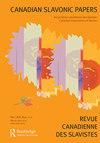Decolonizing minds in the “Slavic area,” “Slavic area studies,” and beyond
IF 1.6
Q2 ETHNIC STUDIES
引用次数: 0
Abstract
Russia’s dramatic escalation of its war against Ukraine in February 2022 compelled many people at last to realize that the Russian “Federation” is in fact an empire. Despite hope in the early 1990s that Russian citizens might transform their country into a genuinely democratic federation, conditions were not auspicious, and particularly after Vladimir Putin succeeded Boris El′tsin (Yeltsin) as president in 1999, limited achievements were gradually enervated. If there was any doubt, the imperial nature of the post-Soviet Russian state should have been obvious following Russia’s occupation and annexation of Crimea in 2014 – and it was particularly telling that Putin was reported to have been avidly reading eighteenth-century Russian history just before his little green men appeared on Ukraine’s Black Sea peninsula. The problem, of course, is not just Putin. As Maksym Sviezhentsev and MartinOleksandr Kisly argue in their contribution to this forum, “de-occupation” may be achieved militarily, but decolonization is first of all a process of the mind, in which both colonizers and colonized – together with “bystanders” – must recognize and overcome imperialist patterns of thought. While Sviezhentsev and Kisly sharply criticize 240 years of Russian colonial practices in Crimea, they also warn their fellow Ukrainians that they risk reproducing patterns of imperialism if they do not recognize the claims of Crimea’s indigenous people, the Crimean Tatars, in the creation of a post-occupation order. Agnieszka Jezyk, in her contribution, likewise points out that interwar Poland – a country freshly reunited and independent after 123 years of partition – harboured a strong movement to imitate one of Poland’s former colonizers (the German Empire) and establish overseas colonies. As far as the bystanders are concerned, Andriy Zayarnyuk has forcefully argued that many Western scholars “enabled” Putin’s aggression against Ukraine by reproducing and normalizing imperialist ways of seeing post-Soviet space. It is in the hope of decolonizing minds – in Slavic and related area studies, in the areas we study, and beyond – that this forum is offered. Discussions of decolonization in the Americas have usually not imagined Europe as a space subject to colonialism, since the perspective from beyond Europe’s shores tends to elide the colonial powers of the continent’s western periphery with the continent as a whole. Denis Diderot, however, saw no essential difference between British schemes to settle Germans in America and Catherine II’s policy of settling them in the Volga valley,“斯拉夫地区”、“斯拉夫地区研究”等领域的非殖民化思想
2022年2月,俄罗斯对乌克兰的战争急剧升级,迫使许多人终于意识到,俄罗斯“联邦”实际上是一个帝国。尽管在20世纪90年代初,俄罗斯公民有望将他们的国家转变为一个真正的民主联邦,但情况并不乐观,尤其是在弗拉基米尔•普京(Vladimir Putin)于1999年接替鲍里斯•叶利钦(Boris El’tsin)担任总统之后,有限的成就逐渐被削弱。如果有任何疑问的话,在2014年俄罗斯占领并吞并克里米亚之后,后苏联俄罗斯国家的帝国性质应该是显而易见的——尤其是有报道称,普京在他的小绿人出现在乌克兰黑海半岛之前,一直在如饥如水地阅读18世纪的俄罗斯历史。当然,问题不仅仅出在普京身上。正如Maksym Sviezhentsev和MartinOleksandr Kisly在他们对本论坛的贡献中所说,“去占领”可以通过军事手段实现,但非殖民化首先是一个思想过程,在这个过程中,殖民者和被殖民者——连同“旁观者”——都必须认识并克服帝国主义的思想模式。尽管Sviezhentsev和Kisly尖锐地批评了俄罗斯在克里米亚240年的殖民行为,但他们也警告乌克兰同胞,如果他们不承认克里米亚原住民克里米亚鞑靼人在建立占领后秩序时的主张,他们就有可能重蹈帝国主义的覆辙。Agnieszka Jezyk在她的文章中同样指出,两次世界大战之间的波兰——一个经过123年分裂后刚刚重新统一和独立的国家——隐藏着一股强大的运动,试图模仿波兰的前殖民者之一(德意志帝国)并建立海外殖民地。就旁观者而言,安德烈·扎亚纽克(Andriy Zayarnyuk)有力地指出,许多西方学者通过复制和正常化帝国主义看待后苏联空间的方式,“使”普京对乌克兰的侵略“成为可能”。提供这个论坛是希望非殖民化思想- -在斯拉夫和有关领域的研究中,在我们研究的领域中,以及在其他领域- -。关于美洲非殖民化的讨论通常没有把欧洲想象成一个受殖民主义支配的空间,因为从欧洲海岸以外的角度来看,往往会把欧洲大陆西部边缘的殖民大国与整个大陆一起忽略掉。然而,丹尼斯·狄德罗认为英国将德国人安置在美国的计划与叶卡捷琳娜二世将他们安置在伏尔加河流域的政策并无本质区别,
本文章由计算机程序翻译,如有差异,请以英文原文为准。
求助全文
约1分钟内获得全文
求助全文

 求助内容:
求助内容: 应助结果提醒方式:
应助结果提醒方式:


